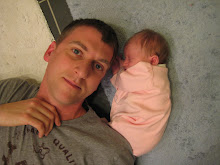Amidst the chaos of a move, the dry bright days of a Portland January, and the constant negotiation of my toddler life, this task of parenting has gotten more complicated. I have been musing about this BIG IDEA for the past few days, so perhaps I will write about it.
We are living a toddler/daddy life at my house. By this I mean that the world my children experience is one that is constructed by me and my fatherly perspective on the world. I have recognized this as a unique thing, different from mothers and grandmas and the often feminized world of child rearing. Jude and Ada are being raised by their FATHER, for good or ill. There are values that I hope to foster, and I feel the weight of responsibility for demonstrating these values and passing them to my children. I'm obviously working in the dark here.
One of the simplest and most straightforward lessons to come up lately is about truth and lies. TELL THE TRUTH, DON'T TELL A LIE seems like a no-brainer. The big problem here is that Jude lies all the time. And by extension, so does Ada. Jude will lie about having a dirty diaper, or how many cookies he ate off the counter, or whatever. I can still tell the difference, obviously. He might tell lies, but he's not very sneaky. Ada just lies because she likes to say NO a lot. "Ada, do you want another bite of yogurt?" NO. , and then BITE A YOGURT, PLEEEZE. She's a polite liar.
But lying is wrong, right? Small lies can turn into big problems. (Believe me about this one.) In an effort to model this, I have taken an almost manic approach to telling my kids what is happening in their lives, even when they don't like it. I've noticed that my wife takes this same approach, though we've never discussed it. The theory is that maybe the truth will hurt, but its best to get the bad news over with.

Example. Maybe Ada is going to Grandma's house for a sleepover and Jude is staying home. This is NOT likely to be met with cheers and applause by Jude, who loves days at Nini's house. I could just keep this information to myself, maybe gloss over the details. I could cover up a bit, avoid the subject, feign ignorance, or any of the above. To me this seems like lying. And yet we do this in the adult world all the time. Enter the WHITE LIE, stage left. Isn't this a slippery slope? If I tell a lie to avoid the tantrum today, what will be waiting for me tomorrow?
I have little patience with a model of child-rearing that "protects" children and their fragile childhoods from the rigors and pitfalls of life. This is an unfortunate trend I find in the preschool set - My children are obviously curious about the world, why would I conceal it from them? We would not tell lies about science or history, so why gloss over the fascinating details of human sociology? The highs and lows, joys and tragedy, isn't this the human experience?

Until now I have avoided raising my children within a religious framework. Am I really the moral compass for these children? I want them to think for themselves and ask their own questions. What am I left with, classical philosophy? Plato and Aristotle are not going to cut it with my guys. If not me, then who? If not now, then when? How do I teach my kids that it's wrong to tell a lie?


Did you read the section "Why Kids Lie" in Nurture Shock? Studies show that 96% of 4 year olds lie and that the better a young child can distinguish a lie from the truth, the more likely he/she will lie like given the chance.
ReplyDeleteThe crazy thing is that being able to successfully lie is a more advanced skill than always telling the truth because a successful liar has to recognize the truth, intellectually conceive of a new reality, and then convincingly sell that reality to someone else. Lying well demands advanced cognitive development and social skills and good liars do better on academic tests. So it is good developmentally, just not morally!
The book goes on to explain how to help kids not only be aware of their lying ways, but also how to develop their moral compass so they stop lying on their own...it seems to come down to examples and reminding kids that what will make you happy is that they "tell the truth" as most lie to cover up things they think will upset you (like when they cheat or throw their veggies in a bush). I'm pulling, but the book hints that most kids who have parents that keep on it grow out of lying around 6 years old.
I think this stuff is crazy fascinating, but it is different to read it and live it. Hope this bit of reading helps :)
Thanks for this, Cameron. I read Nurture Shock when Jude was about 2 months old. That seems like a LONG time ago now. I seem to recall that Freakonomics also made some large conclusions about raising children to future success. Statistically it correlates to having a large number of books on the shelves of your childhood home. Maybe I'm off the hook?
DeleteSeriously, I'm not sure that there is such a thing as a moral compass. But raising up children IS fascinating. In practice, the academic side gets mixed with this strange and tugging anxiety. That's the joys and pitfalls of parenthood, I guess!